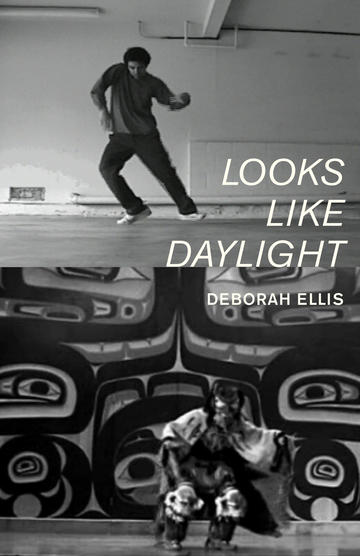After her critically acclaimed books of interviews with Afghan, Iraqi, Israeli and Palestinian children, Deborah Ellis turns her attention closer to home. For two years she traveled across the United States and Canada interviewing Native children. The result is a compelling collection of interviews with children aged nine to eighteen. They come from all over the continent, from Iqaluit to Texas, Haida Gwaai to North Carolina, and their stories run the gamut — some heartbreaking; many others full of pride and hope.
You’ll meet Tingo, who has spent most of his young life living in foster homes and motels, and is now thriving after becoming involved with a Native Friendship Center; Myleka and Tulane, young artists in Utah; Eagleson, who started drinking at age twelve but now continues his family tradition working as a carver in Seattle; Nena, whose Seminole ancestors remained behind in Florida during the Indian Removals, and who is heading to New Mexico as winner of her local science fair; Isabella, who defines herself more as Native than American; Destiny, with a family history of alcoholism and suicide, who is now a writer and powwow dancer.
Many of these children are living with the legacy of the residential schools; many have lived through the cycle of foster care. Many others have found something in their roots that sustains them, have found their place in the arts, the sciences, athletics. Like all kids, they want to find something that engages them; something they love.
Deborah briefly introduces each child and then steps back, letting the kids speak directly to the reader, talking about their daily lives, about the things that interest them, and about how being Native has affected who they are and how they see the world.
As one reviewer has pointed out, Deborah Ellis gives children a voice that they may not otherwise have the opportunity to express so readily in the mainstream media. The voices in this book are as frank and varied as the children themselves.
Deborah Ellis has won the Governor General’s Award, the Ruth Schwartz Award, the University of California’s Middle East Book Award, Sweden’s Peter Pan Prize, the Jane Addams Children’s Book Award, and the Vicky Metcalf Award for a Body of Work. She is a member of the Order of Canada and has been named to the Order of Ontario.
She is best known for her Breadwinner Trilogy, set in Afghanistan and Pakistan — a series that has been published in twenty-five languages, with $2 million in royalties donated to Canadian Women for Women in Afghanistan and Street Kids International.
- Age:
- 12 to 18
- Grade:
- 7 to 12
- Reading age:
- 12 to 18
- Short-listed, Red Maple Award for Non-Fiction
- Winner, Social Justice Literature Award
- Commended, Cooperative Children's Book Center Choices
- Commended, Notable Books for a Global Society
- Short-listed, Norma Fleck Award for Canadian Children's Non-Fiction
- Winner, Aesop Prize
[T]hese young people embrace their distinctive cultural practices and almost without exception, express a buoyant attitude. As gay Chippewa 16-year-old Zack puts it, 'They tried really hard to kill us all off, and we’re still here!'—a welcome and necessary reminder to all.
It’s heartening that so many of these young people are positive about their lives, no matter how troubled, and about their futures....Ellis’ book is an excellent opportunity for classroom discussion and individual, empathy-inducing reading.
Ellis’s transcriptions of these interviews allow the authentic voices of the young people to come through...Important and provocative, this is a good choice for libraries wanting to add a contemporary, youthful perspective on issues affecting indigenous people in North America.
[O]ften simultaneously heartbreaking and hopeful...Unflinching and informative, this volume will appeal to a broad range of readers.
Out of print
This edition is not currently available in bookstores. Check your local library or search for used copies at Abebooks.



